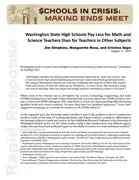Washington State recently passed a law (House Bill 2621) intending to accelerate the teaching and learning of math and science. However, in the two subject areas the state seeks to prioritize, this analysis finds that nineteen of the thirty largest districts in the state spend less per math or science teacher than for teachers in other subjects.
Existing salary schedules are part of the problem. By not allowing any differential compensation for math and science teachers, and instead basing compensation only on longevity and graduate credits, the wage system works to create the uneven salaries.
The analysis finds that in twenty-five of the thirty largest districts, math and science teachers had fewer years of teaching experience due to higher turnover—an indication that labor market forces do indeed vary with subject matter expertise. The subject-neutral salary schedule works to ignore these differences.
Washington state personnel data do not identify teachers or teaching assignments by subject. This analysis meticulously coded teachers by subject matter to understand how actual spending on math and science teachers differs from those of other subjects. Researchers collected and analyzed data from Washington’s thirty largest school districts, including 122 high schools employing 7,151 teachers, of whom 1,792 teach either math or science or both.





